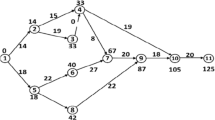Abstract
This study proposes a new model to minimize the project completion time under learning with fuzzy resource-constrained. Experience is a significant factor in performing a job effectively by using time and resources more efficiently and finishing the job under the required time, resources, and financial constraints. It can produce more output under the same constraints because repeated experiences in a work environment accumulate more competence and knowledge. While it is mainly used in studies done for manufacturing environments, its usage in project management is relatively insufficient. In comparison, the number of measurable tasks to observe the learning effect on the process are abundant in project management. Long-term projects such as pipeline and highway construction projects must perform repetitive tasks and benefit from learning effects. Besides, it is essential to specialize in specific projects for organizations in today’s work environment, which can be achieved by expanding their portfolios to include similar projects. In this way, an organization provides an effective way to increase its power of competition by reducing the overall usage of time and resources for similar projects. It is shown that the proposed model has great potential in the more realistic determination of the completion time of the projects. Furthermore, it is helpful for the performance evaluation of the labor involved in the project management.
Access this chapter
Tax calculation will be finalised at checkout
Purchases are for personal use only
Similar content being viewed by others
References
Slowinski, R., Hapke, M.: Scheduling under fuzziness (2000)
Hapke, M., Jaszkiewicz, A., Słowiński, R.: Pareto simulated annealing for fuzzy multi-objective combinatorial optimization. J. Heuristics 6(3), 329–345 (2000)
Lorterapong, P.: A fuzzy heuristic method for resource-constrained project scheduling. Proj. Manag. J. 25(4), 12–18 (1994)
Czyzak, P., Jaskievicz, A.: Pareto simulated annealing: computational experiment (1995)
Özdamar, L., Alanya, E.: Uncertainty modelling in software development projects (with case study). Ann. Oper. Res. 102(1–4), 157–178 (2001)
Wang, J.: A fuzzy project scheduling approach to minimize schedule risk for product development. Fuzzy Sets Syst. 127(2), 99–116 (2002)
Atli, O., Kahraman, C.: The minslack and kangaroo algorithm heuristic for fuzzy resource-constrained project scheduling problems. J. Mult.-Valued Logic Soft Comput. 20, 189–219 (2012)
Badiru, A.B.: Manufacturing cost estimation: a multivariate learning curve approach. J. Manuf. Syst. 10(6), 431–441 (1991)
Thomopoulos, N.T., Lehman, M.: The mixed model learning curve. AIIE Trans. 1(2), 127–132 (1969)
Argote, L., et al.: Group learning curves: the effects of turnover and task complexity on group performance. J. Appl. Soc. Psychol. 25, 512–529 (1995)
Peltokorpi, J., Jaber, M.Y.: A group learning curve model with motor, cognitive and waste elements. Comput. Ind. Eng. 146, 106621 (2020)
Biskup, D.: Single-machine scheduling with learning considerations. Eur. J. Oper. Res. 115(1), 173–178 (1999)
Lee, W.-C.: Scheduling with general position-based learning curves. Inf. Sci. 181(24), 5515–5522 (2011)
Wang, L., et al.: A simple human learning optimization algorithm, vol. 462, pp. 56-65 (2014)
Wang, L., et al.: A hybrid-coded human learning optimization for mixed-variable optimization problems. Knowl.-Based Syst. 127, 114–125 (2017)
Shoja, A., Molla-Alizadeh-Zavardehi, S., Niroomand, S.: Hybrid adaptive simplified human learning optimization algorithms for supply chain network design problem with possibility of direct shipment. Appl. Soft Comput. 96, 106594 (2020)
Wright, T.P.: Factors affecting the cost of airplanes. J. Aeronaut. Sci. 3, 122–128 (1936)
Thomas, H.R., Mathews, C.T., Ward, J.G.: Learning curve models of construction productivity. J. Constr. Eng. Manag. 112(2), 245–258 (1986)
Moore, J.R.: A comparative study of learning curve models in defense airframe cost estimating in Air Force Institute of Technology. Department of The Air Force Air University: Wright-Patterson Air Force Base Ohio, p. 156 (2015)
Asher, H.: Cost-Quantity Relationships in the Airframe Industry. The Rand Corporation, Santa Monica (1956)
De Jong, J.R.: The effects of increasing skill on cycle time and its consequences for time standards. Ergonomics 1(1), 51–60 (1957)
Levy, F.K.: Adaptation in the production process. Manag. Sci. 11(6), B-136–B-154 (1965)
Glover, J.H.: Manufacturing progress functions I-an alternative model and its comparİson with existing functions. Int. J. Prod. Res. 4(4), 279–300 (1965)
Knecht, G.R.: Costing, technological growth and generalized learning curves. J. Oper. Res. Soc. 25(3), 487–491 (1974)
Yelle, L.E.: Estimating learning curves for potential products. Ind. Mark. Manag. 5(2), 147–154 (1976)
Wang, L., et al.: An adaptive simplified human learning optimization algorithm. Inf. Sci. 320, 126–139 (2015)
Wang, L., et al.: A human learning optimization algorithm and its application to multi-dimensional knapsack problems. Appl. Soft Comput. 34, 736–743 (2015)
Wang, L., et al.: An improved adaptive human learning algorithm for engineering optimization. Appl. Soft Comput. 71, 894–904 (2018)
Atli, O.: Tabu search and an exact algorithm for the solutions of resource-constrained project scheduling problems. Int. J. Comput. Intell. Syst. 4(2), 255–267 (2011)
Atli, O., Kahraman, C.: Fuzzy resource-constrained project scheduling using taboo search algorithm. Int. J. Intell. Syst. 27(10), 873–907 (2012)
Author information
Authors and Affiliations
Corresponding author
Editor information
Editors and Affiliations
Rights and permissions
Copyright information
© 2022 The Author(s), under exclusive license to Springer Nature Switzerland AG
About this paper
Cite this paper
Güldeş, M., Atici, U., Şahin, C. (2022). Fuzzy Resource-Constrained Project Scheduling Under Learning Considerations. In: Kahraman, C., Cebi, S., Cevik Onar, S., Oztaysi, B., Tolga, A.C., Sari, I.U. (eds) Intelligent and Fuzzy Techniques for Emerging Conditions and Digital Transformation. INFUS 2021. Lecture Notes in Networks and Systems, vol 307. Springer, Cham. https://doi.org/10.1007/978-3-030-85626-7_74
Download citation
DOI: https://doi.org/10.1007/978-3-030-85626-7_74
Published:
Publisher Name: Springer, Cham
Print ISBN: 978-3-030-85625-0
Online ISBN: 978-3-030-85626-7
eBook Packages: Intelligent Technologies and RoboticsIntelligent Technologies and Robotics (R0)




